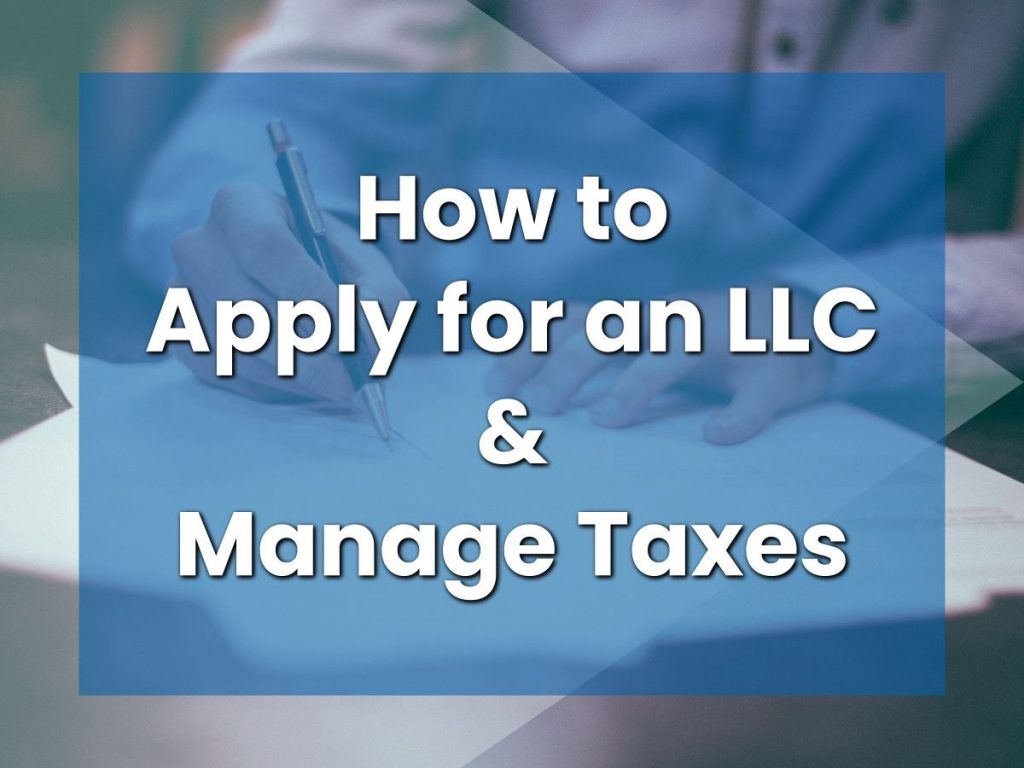How to Apply for an LLC and Manage Taxes

To apply for an LLC online, you can file on your own with the state where you’re doing business, or simply use MyCompanyWorks’ online ordering system. We’ll help you apply for your LLC and draft the required documents to establish your company.
What’s the LLC meaning?
LLC stands for Limited Liability Company. It’s a business entity where the owners are not personally liable for the company’s debt. An LLC can be structured as a sole proprietorship, partnership, or corporation. The company can have more than one owner and it doesn’t have to be run by a single person. The advantages and disadvantages vary depending on what industry you are in, the number of members, and whether you operate as an S-Corp or not.
An LLC is taxed as a pass-through entity, meaning it does not pay corporate income tax on the company’s profits, but instead passes them through to each member of the LLC. Taxes are filed on each member’s personal income tax return.
An LLC can provide great liability coverage to its owners. This is because it does not have to worry about whether it has enough assets to protect all its liabilities because any assets it owns can be used to satisfy any claims against it. This advantage, along with less formal management and lower tax liability is among the primary reasons small businesses go with the LLC entity type for their operations.
LLC Tax Deductions for Business Expenses
Just like with Corporations, LLCs can write off legitimate business expenses. They’re not really considered tax “deductions”, but rather expenses that reduce the amount of tax you’ll pay. Expenses that directly relate to running your business, like rent, labor, office supplies, etc., can all be written off to reduce tax liability.
TIP: Always keep personal expenses separate from your LLC to prevent raising any tax liability red flags with the IRS.
How do I apply for an LLC?
Typically you’ll file your LLC paperwork with your chosen state’s business division. For a comprehensive list, you can use our handy State Startup Guides. If your state LLC division has a different name, you should be able to find it in the search results. Most states have online filing systems, but some state websites aren’t very user-friendly, so make sure you have plenty of time and a healthy dose of patience to complete the application.
You’ll need to create the Articles of Organization which must be signed by the LLC’s organizer and must contain:
1) Name of the company
2) Address where the company will conduct its primary business
3) Name and address of each person who will manage or control activities at this address (agents or managers)
You’ll also need to appoint a Registered Agent to accept official legal and government documents on your behalf. You can be your own Registered Agent, but you must be available during business hours to accept official mail and documents. If you’re unable to be your own agent, our Commercial Registered Agent service may just be the perfect fit for your company.
Once you have registered your business and appointed a Registered Agent, you can hold your initial organizational meeting to form your LLC. Note that even a single-member LLC must hold an initial meeting and record minutes for your company records.
Skip the line and apply for your LLC now through our online LLC formation service.
What You Should Know About Federal Taxes for LLCs
In the United States, the IRS taxes LLCs as a partnership. In general, partnerships are not taxed at all on income from sources within the partnership, but members of a partnership are taxed individually on any profits received from the partnership. As an LLC, you can elect to be taxed as a corporation or a sole proprietorship for federal tax purposes. If you do not elect either option, your LLC will be considered a general partnership and will be subject to individual taxation for both profits and losses.
What You Should Know About State Taxes for LLCs
State taxes for LLCs vary from state to state and are in addition to federal income tax. There are some states that allow you to file and pay your state taxes on your federal tax return, but other states require you to file separate returns and tax payments. There are some accounting programs, like Quickbooks, that will allow you to set up federal and state tax reporting right in the software. Working with an accounting firm can also help you complete tax returns and make the proper payments.
4 Major Benefits to Applying for an LLC
Flexible ownership, simple management, and potentially lower tax burden are all top reasons why LLCs are the most preferred business entity type in the US. With an LLC, you can enjoy the benefits of both corporations and partnerships.
Some of the benefits of establishing an LLC include:
- Limited personal liability
- Potential tax deductions and credits
- Pass-through taxation, which means you only pay taxes on the money that goes into the company and not on what comes out
- LLCs can own other businesses such as corporations, partnerships, or other LLCs
Apply for Your LLC Today
The main goal of this article is to help you understand the process of how to apply for an LLC and how to manage LLC taxes. Whether you’re running one or many businesses, the LLC is an affordable solution for business formation. Contact your state business division if you want to apply for an LLC on your own, or save time and money with MyCompanyWorks online LLC filing service.
This page may contain affiliate links, which means MyCompanyWorks may receive a commission if you make a purchase using these links.